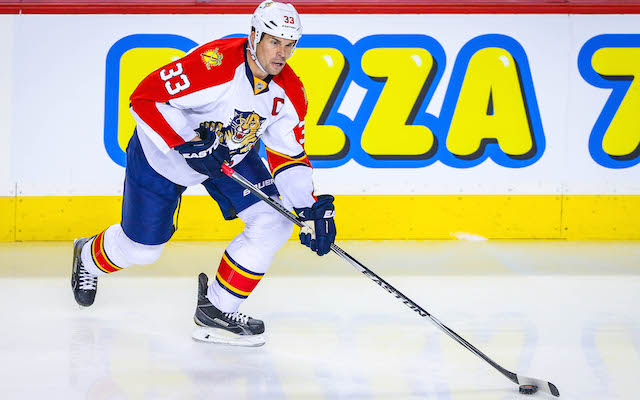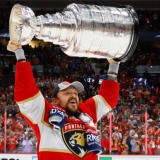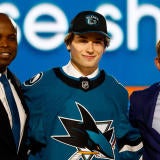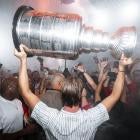Florida Panthers defenseman Willie Mitchell has not played in a game since mid-January after he was diagnosed with the seventh concussion of his NHL career.
In an interview with Sportsnet's Arash Madani over the weekend, Mitchell talked about his uncertain future in the NHL as the 39-year-old continues to debate whether or not he can ever return to the ice.
As part of that interview he also addressed the way the NHL handles discipline for hits to the head, and feels that the league needs to do more to protect its players. You can read the entire thing here.
As for Mitchell's comments on player discipline, let's dig into that a little bit.
"The league needs to do a better job," Mitchell said. "Guys need protection. "There’s a concern with players. Guys are worried about it. Guys talk about it – the league isn’t doing enough to protect the players," Mitchell said. "A couple of years back, a 20-game suspension was a message. You’d be missing games, you get a big chunk of money taken from your pocket – a quarter of your (annual) salary gone. Those suspensions had gotten the game safer – still physical, still fast. Shanny (Brendan Shanahan, then the league’s chief disciplinarian) did a great job. But it’s not like that now."
He added that it is something players are concerned about and are discussing in the locker room but are afraid to speak about publicly out of fear of being fined by the league (Madani said he spoke to several Panthers players off the record who were upset that Chicago Blackhawks defenseman Duncan Keith was only given a six-game suspension for his stick-swinging incident involving Minnesota Wild forward Charlie Coyle).
More from Mitchell:
"I'd like to think I’m a rational guy. I'm not an F-U guy. I'm not criticizing the league as a whole,” he said. “If my game slips, a coach will come tell me, it's slipping. Well, on trying to protect us, the league is slipping.”
He is right about a lot of things here, specifically the part in that first excerpt about Brendan Shanahan getting things moving in the right direction only to have everything take a couple of steps back since he left the league office to become the president of the Toronto Maple Leafs.
To be fair, the league has improved from where it a few years ago when it came to penalizing these things. Before the 2011-12 season the NHL was pretty much a free-for-all when it came to hits to the head and suspensions that were handed out seemed to be done via a random wheel of discipline. This was during the time when Marc Savard and David Booth had their careers significantly altered (or ruined, if you prefer -- their careers were ruined) by brutal head shots from Matt Cooke and Mike Richards.
Those were not body checks made by players with the intention of separating an opponent from the puck or winning a puck battle along the wall. Those were cheap shots that targeted the head and were dished out by players looking to cause as much damage on their opponent as they possibly could. And at the time, they were considered legal, clean hockey with supporters of that type of play screaming about how you need to "keep your head up."
Even though those hits did not result in suspensions at the time (Cooke's hit didn't even result in a penalty; Richards was ejected for interference on his hit), they were among the plays that helped lead to the creation of Rule 48 that attempted to eliminate hits that target the head, as well as the creation of the department of player safety. The department was put into place at the start of the 2011-12 season and had Hockey Hall of Famer Brendan Shanahan replace Colin Campbell as the league's top disciplinarian.
In that first year, the suspensions were frequent, and at times, harsh. The department issued 44 suspensions that resulted in players missing regular season games that season, with 11 of those suspensions (25 percent of them) going for at least five games.
In 2012-13 (which was a lockout shortened year that cut the season in half) the DoPS handed out 17 suspensions that resulted in regular season games being missed, with three of them being for five games or more. In 2013-14 there 35 suspensions with 10 of them being for five or more games.
Since the start of last season though (when Shanahan was replaced by Stephane Quintal), there have been some changes. The number of suspensions has dropped (not significantly, but they have definitely dropped) as has the severity.
In 2014-15 the DoPS handed 28 suspensions that impacted the regular season, with only three of them going for five games or more. So far this season, and including the recent suspensions for Keith and Nazem Kadri, there have been 29 with, again, only three of them going five games or more.
The only ones that have gone beyond five games this season have been for players that each have a lengthy history of suspensions: Boston's Zac Rinaldo was given a five-game ban for an illegal check to the head of Cedrig Paquette while Keith was given his six-game suspension for his second stick-swinging incident. The longest of the suspensions was Raffi Torres who has been such a habitual repeat offender in the league that they finally had to do something drastic with him.
Just to recap those numbers: 24 of the 96 suspensions (25 percent) handed out during the regular season for the first three years of the DoPS were for five or more games.
Over the past two years only six of the 56 suspensions (10 percent) have been five games or more.
These numbers do not include suspensions for off-ice incidents or suspensions that are handled by the NHL's hockey operations department (substance abuse violations, arrests, or for incidents like the Dennis Wideman suspension). It only includes suspensions the DoPS would handle for illegal hits.
Are players suddenly behaving better and adjusting to the rules and standards? It is entirely possible, and there does seem to have been a decline in the number of blatant cheap shots around the league. But does that account for why the suspensions that are being issued are not as severe as they once were?
And let's face it, there were still quite a few things in the NHL this season that could have -- and probably should have -- been punished and were not, and some of the ones that were probably could have been more severe.
The more likely cause for those declining numbers are teams (and perhaps even the players themselves) started to push back at the league when the early days of the Shanahan era were handing out so many lengthy suspensions, as well as the fact players can now appeal suspensions that are six-plus games.
Is the league handling these things better than it used to? It is. But it's still not where it should be and there are a lot of areas where everybody needs to be better.
From an NHL standpoint the one-and two-game suspensions that we see do nothing to serve as a deterrent or punishment. The league can -- and should -- be more severe with this stuff because the small suspensions just are not getting through.
But the teams themselves need to take some responsibility here, too. As long as general managers see enough value in players like Rinaldo and Torres that they want to acquire them and play them in a meaningful way they have to be responsible for when they inevitably cross the line, because it is only a matter of time until they do.


















